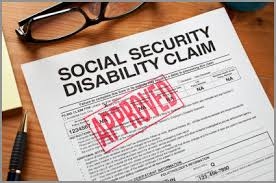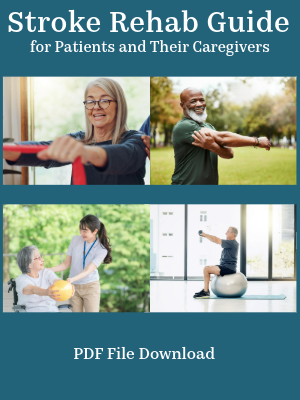Applying for Disability Due to Stroke
|
Applying for disability benefits can include private or government benefits. In the US, certain employers must comply with the Family and Medical Leave Act (FMLA) depending on if they're a public entity or a private entity of a certain size. |
 |
The FMLA ensures that "eligible" employees are allowed to take off 12 weeks in any 12 month period if they experience a serious health condition such as a debilitating stroke. It is good to know that family members may be eligible to take time off work under FMLA to care for a family member that has experienced stroke. To find out more about FMLA, you can visit www.dol.gov/WHD/fmla/index.htm
Private Benefits
If you have disability insurance through your place of employment, contact your human resources department for instructions regarding application for disability after stroke. If you're not sure about your benefits, definitely call HR to find out about any coverage you may have.
If you have private disability insurance that you have previously purchased on your own, check with your insurance agent to help you apply for benefits.
Government Benefits in U.S.
The US Social Security Administration pays disability benefits through two programs: Social Security Disability Insurance (SSDI)and Supplemental Security Income (SSI). To be considered disabled by the Social Security Administration, one must be unable to do any substantial work due to a medical condition and the medical condition has to last one year or be expected to last one year. SSDI is for insured workers, their disabled surviving spouses, or children of disabled/deceased workers. SSI is for people with little or no income and resources. Find out more about the two programs and apply online, visit http://ssa.gov
The Disability Benefits Center, an independent nonprofit organization that helps people apply for Social Security benefits, lays out the following as requirements and guidance:
You qualify for disability benefits if you’re unable to:
- Speak or write effectively due to expressive or receptive aphasia
- Control the movement of at least two extremities (either an arm and a leg or two arms or two legs), despite at least three months of treatment. This must result in extreme difficulty in balancing while standing or walking, to stand up from a seated position, or to use the arms.
- Overcome marked physical problems along with a marked limitation in any one of the following: thinking, interacting with others, finishing tasks, regulating emotions and controlling behavior
Gathering the Pertinent Medical Information
Before starting your application, gather all relevant medical documentation related to your stroke. This includes medical records, test results, treatment history, and any other supporting documents that highlight the severity and impact of your stroke on your ability to work.
Initiating the Application Process:
To apply for Social Security Disability benefits, you have two options: visiting a local Social Security office or applying online through the SSA website. Prepare to provide detailed information about your medical condition, work history, and personal details.
Seek Assistance from Healthcare Providers
Enlist the support of your healthcare providers and rehabilitation specialists during the application process. Their medical expertise and insights can strengthen your case by providing professional documentation and opinions regarding the severity of your stroke and its impact on your ability to work. Make sure you have gathered all necessary medical information from doctors, therapists, surgeries, imaging studies, etc. that back up your claim.
Patience is Key
Once you've submitted your application, it's important to be patient. The process can take time, often several months, as the SSA carefully evaluates your claim. Ensure you promptly respond to any requests for additional information and maintain open communication with the SSA throughout the review process.
Applying for Disability Pitfalls
Social Security benefits can be denied for the smallest of errors. In fact more people are denied than are accepted. It is important to know if you qualify for benefits and how to appropriately fill out forms. Review forms you fill out for any errors and don't leave blanks. Be very specific in your description of how your disability has affected your daily life (e.g. can no longer work, walk, maintain house, play or take care of children, perform self-care, can only use one arm for tasks, have frequent falls, etc.) It would be helpful to have an advocate or attorney experienced with disability benefits to help you fill out the appropriate forms or review your forms before submitting to minimize delays from mistakes and to prevent denial.
What If I'm Denied Disability?
If you are denied after applying for disability, you can file an appeal. The Social Security Administration (SSA) provides a process for appealing a denied disability claim. You can file an appeal online or in person at your local SSA office.
If you can’t work as a result of medical problems due to stroke, but don’t qualify based on the criteria set by SSA, you may be eligible for benefits through a Medical Vocational Allowance. To get this exception, your doctor must describe your limitations on a Residual Functional Capacity evaluation form. The Social Security Administration will examine the evaluation form as well as your work history and skills to try to find work that you can do. If the SSA can’t find work you can do, you may be eligible for benefits.
If you have been denied long-term disability after a stroke, hiring an experienced long-term disability attorney can help you gather the evidence you need to appeal the wrongful denial of your long-term disability claim.
Disability in Other Countries
To find out about disability benefits in other countries, click on the appropriate link below:
Australia: Department of Social Services
New Zealand: Ministry of Social Development
You can also find more information about disability laws and acts by country/area on the United Nations Enable website.
Get Our Stroke Rehab Guide

Our comprehensive stroke rehab guide in pdf format is designed for both patients and caregivers who want clear, practical ways to support recovery, improve daily function, and regain independence at home. It includes
- Rehab exercises with pictures for safe home practice
- Physical, occupational, and speech therapy guidance
- Tips for daily activities and adaptive equipment
- Answers to common questions from patient and caregivers
- Information on stroke causes, treatment, and prevention
A single therapy visit can run $150 or more. The Stroke Rehab Guide is only $14.99, and includes a pdf guide you can continue to refer to in the future with exercises and information on stroke recovery. In addition, any time an update or new version of the guide is written, you will get the updated version for free.

About the Author
Karen Murray, OTR, CHT, CSRS, is a licensed occupational therapist, Certified Stroke Rehabilitation Specialist, Certified Hand Therapist, and Certified Personal Trainer with over 29 years of experience working with stroke survivors in hospital, outpatient, and home settings. She founded Stroke-Rehab.com to help patients and caregivers better understand stroke recovery, find evidence-based resources, and regain independence at home.
Medical Disclaimer: All information on this website is for informational purposes only. This website does not provide medical advice or treatment. Always seek the advice of your physician or other healthcare provider before undertaking a new healthcare or exercise regimen. Never disregard professional medical advice or delay seeking medical treatment because of something you have read on this website. See the disclaimer page for full information.
Sign Up For Our Newsletter

Newsletter Sign Up
Receive Stroke Recovery Tips, our online quarterly newsletter. Sign up below for free tips on exercises, resources, latest technology, apps, research and more!
To view past issues of Stroke Recovery Tips, visit https://www.stroke-rehab.com/Stroke-Recovery-Tips-BackIssues.html










